Iraqis struggle to survive after being freed from ISIS
Mosul, Iraq – Filing on foot past Iraqi troops, dozens of exhausted people walked across the bridge over the Tigris River, at a crossing approximately 50 miles from Erbil on the road outside Mosul, right before sunset.
Rain in the northern part of the country flooded the river and Iraqi soldiers were forced to disassemble at least two temporary bridges on the road to Mosul. Many of the bridges in northern Iraq had been destroyed since the rise of ISIS, which still holds at least 25 percent of Mosul. And after the flood subsided it took Iraqi soldiers nearly two full days to reassemble one of the bridges.
Civilians attempting to reach safety in East Mosul from the ISIS-controlled western part have to head southeast out of the city to cross the Tigris.
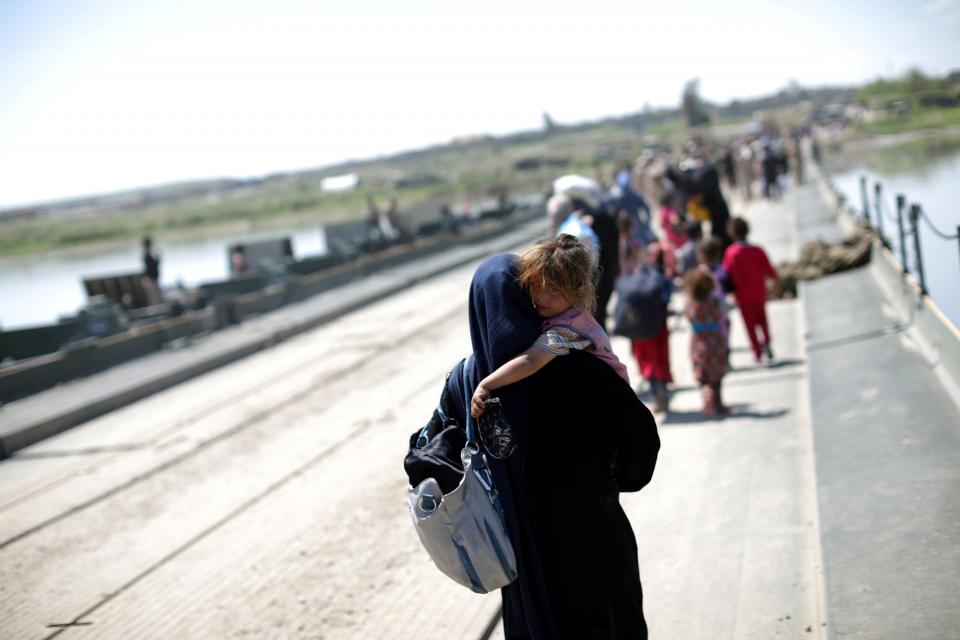
The United Nations Humanitarian Coordinator for Iraq, Lise Grande, told Yahoo News that when the bridge is closed it’s difficult to get aid to internally displaced persons (IDPs) fleeing the Islamic State. “What we’ve been doing is drawing down on the supplies that were already in the area,” she said, but in one district where there is an emergency camp, Hajj Ali, they “couldn’t provide” some of the necessary aid.
One of the Iraqi Army’s mechanics, Mohammed, told Yahoo News, “We took out the bridge, and we used [the boats] for the people, to take them [back and forth] between the east side and west side.”
The boats were brought from a military base. Mohammed estimated that thousands had come to the river hoping to cross, but he couldn’t be certain. Not everyone made it. The small motorboats had been packed with fleeing people all weekend. Then soldiers took the boats away, strapped onto military vehicles headed back to their base, while other soldiers shoveled dirt onto the bridge supports to shore them up.
Some of the families crossing stopped briefly to tell Yahoo News where they had come from or where they were going. Ashikat, 19, traveling with her mother, said she came from Jadida, the neighborhood hit by a U.S. airstrike last month. They had been staying in Mosul with another family, and were on their way to the house of Ashikat’s uncle in the eastern part of the city.
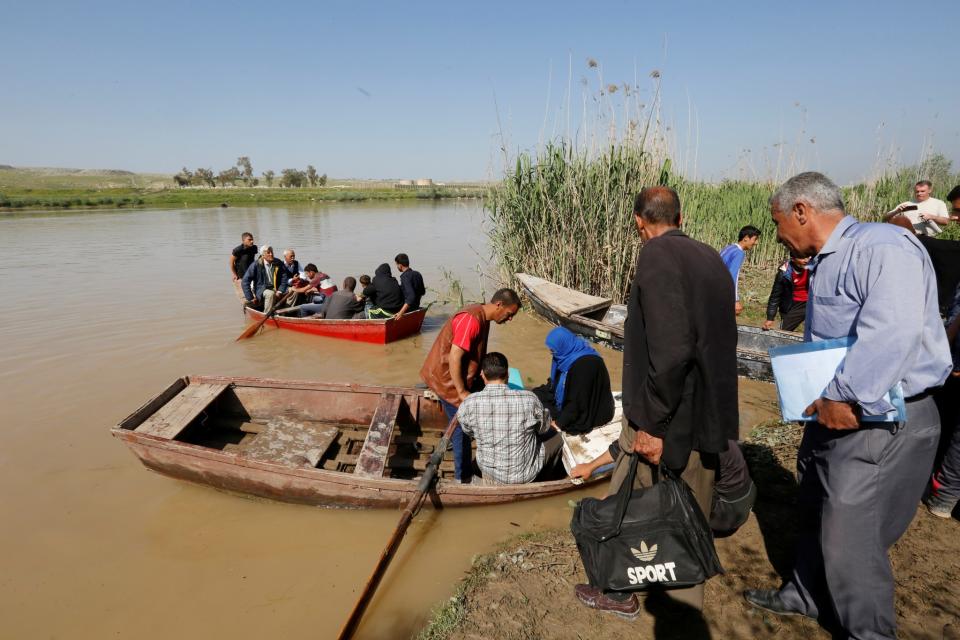
At a river-road checkpoint guarded by Iraq’s Popular Mobilization Forces (PMF), a mostly Shia brigade, four elderly men sat on the side of the road, waiting to be allowed to cross back into Mosul, to their homes.
Atia Khader, an elderly shepherd, said he was worried that all of his sheep were dead. “I want to go back home, and they won’t let me go, we even have buffalo there, we left everything there, car, house, everything,” he said, “The [PMF] said we don’t have permission. We asked where we can get permission, and they said we cannot go.”
Khader had fled his home over a month ago, and had been staying in the eastern part of Mosul in an abandoned and bombed-out apartment building.
*****
Deep inside west Mosul, in the neighborhood of Dawassa, 30-year-old Zachariyah stooped to sift through a pile of garbage to find vegetables worth saving. What he thought was edible, he put in a trash bag to carry back to his family.
Zachariyah told Yahoo News that ISIS moved them from neighborhood to neighborhood. “ISIS was controlling this area, and they forced us to leave, now we’ve returned, but we have nothing to eat. I’m looking for something I can take to my family. I’m trying to find the good things.”
He went on to say he did not want to be displaced and live in the camps, because he believes it is “terrible there,” and that people suffer. “[The camps] are controlled; you’re not allowed to leave the camp, and you’re not allowed to work,” he said.
When sniper fire got closer, targeting federal police in the area, the few residents out on the streets went to their houses, and we headed for the nearest checkpoint.
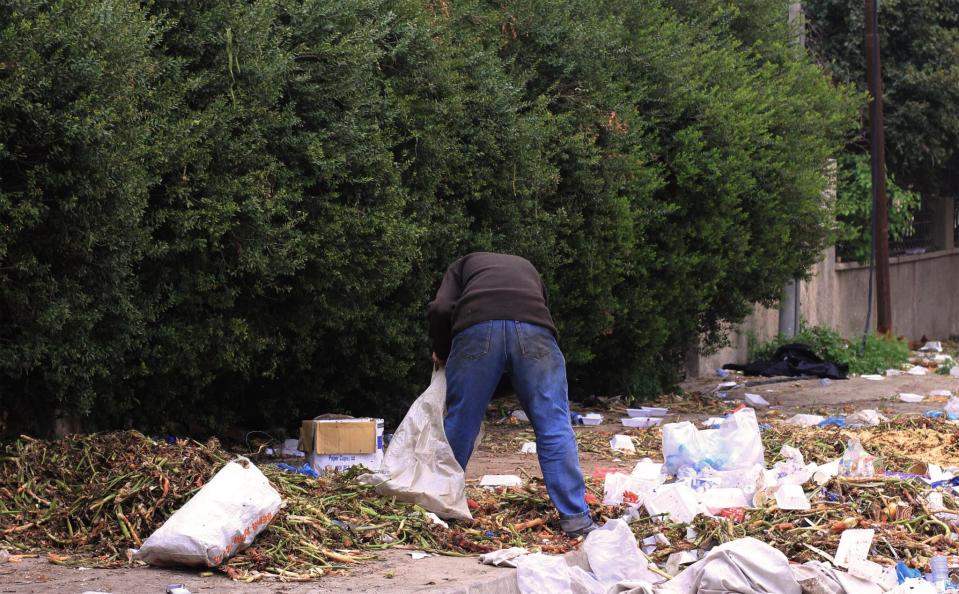
*****
Iraqi forces and federal police are known to ask civilians to stay in their homes and raise white flags outside their houses — a sign that they are civilians rather than ISIS combatants.
While the Iraqi government has not released official numbers for the deaths in western Mosul, human rights groups are concerned that the urban warfare in the west is an increasing threat to civilians.
Yahoo News spoke to federal police who have been on the frontline. Officer Akan Zarqazi said, “All the streets are very narrow, so it’s difficult for us to be alone there. We need help and support to control the street and the houses. It’s better for us to search houses one by one, and [the civilians] help us on catching ISIS families and fighters.”
He admitted that the standing policy was to get as many civilians to safety as possible. But he also said, “We can’t force people out if they don’t want to leave.”
The U.N. believes that there are almost a half million people still in west Mosul. Grande said, “We’re most concerned about the old city [of Mosul] because our understanding is that there are very limited food stocks, electricity has been cut, water has been cut,” and people are surviving, if at all, on food they’ve been able to hoard.
In the event of a total blockade of the old city, Grande says the U.N. fears for the “hundreds of thousands” trapped inside. “We’ve been able to stay just ahead of the exodus [of IDPs], but if 40 or 50,000 came out at one time, we would be overwhelmed,” she said.
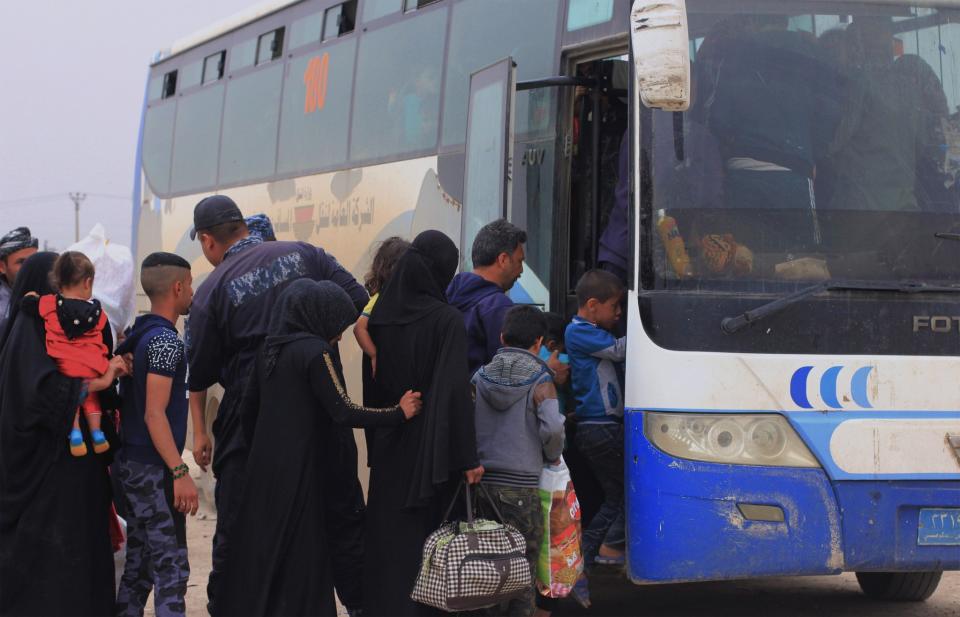
At the checkpoint Yahoo News visited inside Mosul, people were climbing onto buses to go back to their homes in liberated neighborhoods.
One man, Nashwan, said he had left Mosul a few months ago and had been in a camp in the Qayyara region, where for several days in a row all he had to eat was bread. “I miss [Mosul],” he said. “The police helped to get us away from ISIS. The Islamic State was everywhere. Anyone who tried to escape, they would kill him.”
Grande said Qayyra was one of the biggest concerns for the U.N, with thousands of IDPs stationed there and food stocks “dwindling very quickly.” Without adequate food and water, the IDPs are at risk of waterborne diseases, which can be fatal.
At a new IDP camp at the Hamam al-Alil site, where screenings are often conducted, PMF guards have taken charge. Inside, newly escaped IDPs are struggling.
Muktab Khamis, a community leader in the camp, told Yahoo News that one NGO associated with the U.N. had come to distribute food. But in the past month, they have not seen anyone else. “To be honest with you, a lot of people come to me every day,” he said. “For example, a woman came yesterday who lost her husband in Mosul. She had nothing. She didn’t have water or any food. She was starving with her children.”
Khamis’ voice was desperate. He said the PMF give their own rations to the people in the camp, but it was not enough. He explained, “Sometimes we never eat, or we give the food we have to the women and to the children.”
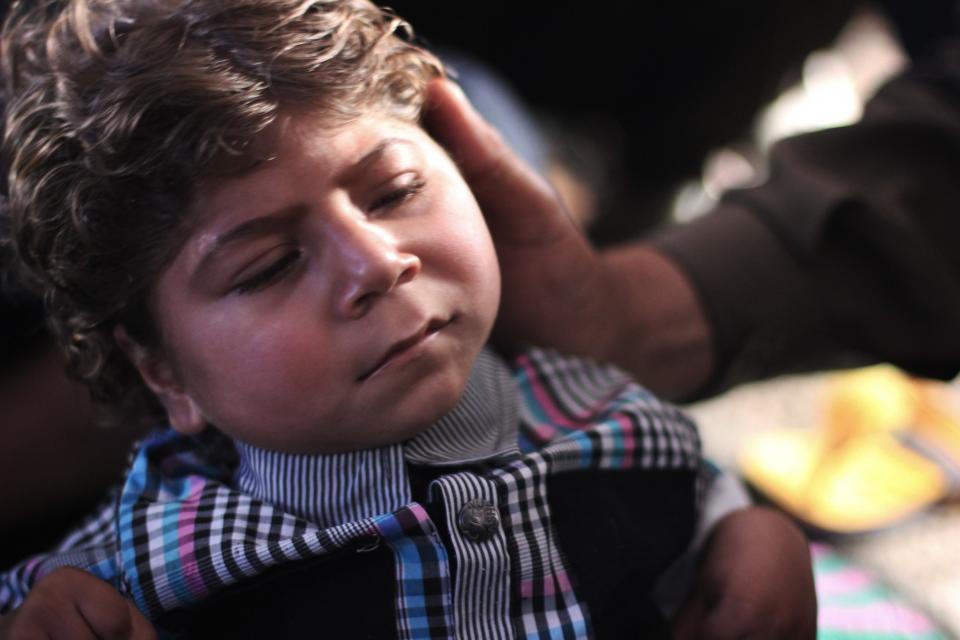
One woman, Aziza, said she has saved some of the food from the first truckload that came for her small family. There are six living in her tent, but food is running out.
She said she went hungry for a long time under ISIS. In western Mosul, her husband, son and son-in-law were all killed after being accused of helping Iraqi Federal Police, after which ISIS left her to starve. “I had nothing to eat. They refused to help us. I wanted to receive [my husband’s] monthly salary, but they used to take it from the bank.”
*****
Although the Tigris River is full, the water is unlikely to be safe to use. The U.N. is hoping to work with Iraqi government officials to come up with a solution. As the weather gets warmer, the need for clean water sources will increase. And if the U.N. and their partners cannot come up with funding, the food resources may be cut off.
Ash Gallagher is a journalist covering the Mideast for Yahoo News.
_____
Read more from Yahoo News:


